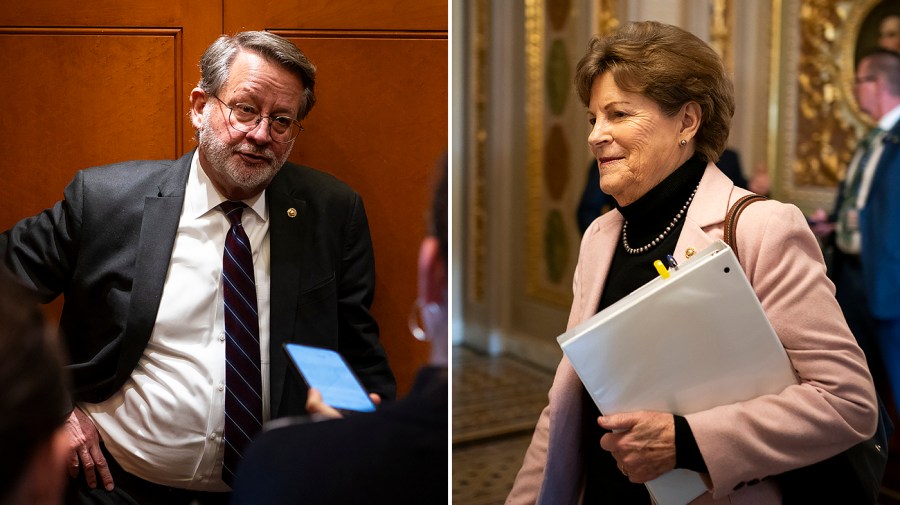
Group of Senate Democrats eye abandoning shutdown fight — but get pushback
A group of centrist Senate Democrats are sounding out Democratic colleagues on a potential deal to reopen the federal government this week or next week, but they’re getting strong pushback that could scuttle a potential agreement, according to people familiar with the discussions.
A senator familiar with the behind-the-scenes negotiations said that centrist Democrats, including retiring Sens. Jeanne Shaheen (D-N.H.) and Gary Peters (D-Mich.), have the contours of a deal and are “whipping” more of their colleagues to sign on — but it’s not yet clear whether they’ll get enough additional votes to end the 36-day shutdown.
Senate sources say that Sen. Maggie Hassan (D-N.H.) has also signaled she would likely support a deal to reopen the government.
Such a deal would include a plan to pass regular appropriations bills and a promised vote on extending expiring health insurance subsidies.
The final details, however, have yet to be finalized.
“There’s a plan, we’ve all kind of semi-agreed to it and we’re now seeing not whether Schumer will support it but whether he will not blow it up,” said a senator, who requested anonymity to discuss the negotiations, referring to Senate Democratic Leader Chuck Schumer (N.Y.).
Senate Democrats met for more than two hours at lunch Tuesday to discuss the parameters of the emerging deal.
One person familiar with the heated discussion Tuesday within the caucus says there appears to be at least eight Democratic votes to reopen the government — even though progressive Democratic senators vented their frustration with the potential deal.
“To me it looked like there were eight votes but it could change. There’s a lot to think about,” the source cautioned. “Nobody can predict the future.”
If Shaheen, Peters and Hassan vote for a short-term spending deal, Republican leaders would need only two more votes to reopen the government.
Because Sen. Rand Paul (R-Ky.) has repeatedly voted against a House-passed continuing resolution to fund the government through Nov. 21, GOP leaders need eight Democrats to cross the aisle.
Sens. John Fetterman (D-Pa.), Catherine Cortez Masto (D-Nev.) and Angus King (Maine), an independent who caucuses with Democrats, have already voted repeatedly in favor of the bill.
Sen. Jacky Rosen (D-Nev.), Cortez Masto’s home state colleague, is considered another potential “yes” vote for the deal.
Other Democrats who have been involved in talks with Shaheen and Peters are Sens. Jon Ossoff (D-Ga.), who faces a competitive re-election next year, and Sens. Mark Kelly (D-Ariz.), Peter Welch (D-Vt.), Tammy Baldwin (D-Mich.) and Elissa Slotkin (D-Mich.).
Slotkin, however, signaled to reporters Tuesday that she wants to see a solution to rising healthcare costs as part of any agreement to fund the government.
“When there’s a deal and we get something on health care, I’ll be ready to reopen the government,” she said.
Senators familiar with the contours of the emerging deal say that it would create a path for approving an appropriations package to fund part of federal government through 2026 and would guarantee Democrats a vote in the Senate on extending enhanced health insurance premium subsidies under the Affordable Care Act (ACA).
But in an important development, Senate Majority Leader John Thune (R-S.D.) said Tuesday morning that any proposal to extend the expiring heath premium subsidies would need 60 votes to advance in the Senate. He ruled out the possibility of allowing such a measure to pass with a simple-majority vote.
Progressive senators are hoping that Schumer, who has been strong throughout the shutdown in demanding a meeting with President Trump to negotiate a deal to curb health care costs, will use his personal influence with Peters, Shaheen, Hassan and other centrists to steer them away from supporting the deal.
“That’s what leadership is all about. Is this just to let us all vent so we can pretend we were hurt? Or are we shaping this into a plan that keeps Democrats united and achieves some objective? That requires a person with the hand on the tiller,” said a Democratic senator who wants Schumer to step in more forcefully to keep Democrats from defecting from the broader caucus position.
Schumer stayed largely neutral on the emerging proposal that centrist Democrats presented to their colleagues in the Lyndon Baines Johnson Room, just off the Senate floor.
Speaking at a press conference after the lunch meeting, Schumer was tight-lipped about where things stand in his caucus, saying: “We had a very good caucus and we’re exploring all the options.”
Other Senate Democrats pushed back hard on the potential deal at Tuesday’s lunch meeting, warning their centrist colleagues that they would not hold back from criticizing what they view as a weak deal with Republicans to reopen the government, according to sources familiar with the discussion.
One Democratic senator who requested anonymity said there are “strong divisions” within the Senate Democratic caucus about whether Republicans have offered enough to reopen government.
A key Democratic demand throughout the shutdown has been for Trump to meet with them to negotiate a solution to rising health care costs and that hasn’t happened.
The blunt message from some liberals to wavering centrist Democrats is that they should not expect any applause for cutting a deal to reopen government that does not ensure that millions of Americans will see relief from rising health insurance costs on the ACA marketplace.
They pointed out several flaws in the deal.
One of the biggest holes in the potential agreement is that centrist Democrats have not secured the commitments of enough Republican senators to ensure that any bill that comes to the floor to extend the ACA subsidies will actually pass the Senate.
And the centrist Democrats negotiating the deal haven’t secured a commitment from Speaker Mike Johnson (R-La.) that he would put any Senate-passed deal to extend insurance subsidies on the House floor for a vote.
There’s also strong concern among many Democratic senators that if eight to 10 Democrats vote to reopen the government without a significant concession from Trump, it will dispirit the Democratic base that has started to show some new enthusiasm for their party during the historic shutdown.
Some liberals warned that centrists who cut a deal with Republicans to fund the government without a viable plan for extending health insurance subsidies would face a political backlash.
But centrists responded by arguing that sparking a civil war over reopening the government wouldn’t help the Democratic Party in the long term.
“The response to that was, ‘Let’s not destroy ourselves over this,’” said a person familiar with the tense debate.
Schumer, speaking to reporters after the lunch, highlighted the start of the open enrollment period for the ACA’s health insurance market, and vowed to keep fighting.
“We’re going to keep fighting day after day, vote after vote, until Republicans put working families of the wealthy few,” he declared.
The deal has been hashed out by Democratic and Republican members of the Senate Appropriations Committee, who have worked together to advance several appropriations bills earlier this year.
The bipartisan group of negotiators are talking about attaching a continuing resolution to fund the government until mid-December or mid-January and attaching it to a package that has been “pre-conferenced” with House Republicans to fund military construction, veterans affairs, the Department of Agriculture and the Legislative Branch through fiscal year 2026.
Sen. Bernie Sanders (I-Vt.) warned on the Senate floor that it would be a mistake to vote to reopen the government without getting a real concession from Republicans to lower health care costs, making it clear that he doesn’t view a vote on extending the subsidies is enough.
“This may well be the most consequential moment in American history since the Civil War. The decisions that we in Congress make right now will impact this country for generations to come,” Sanders declared on the Senate floor Tuesday evening.
“I will not vote for a budget that throws 15 million Americans off the health care that they have. I will not be voting for a budget that doubles premiums for 20 million Americans,” he said.
Updated at 6:47 a.m. EDT

Comments are closed.